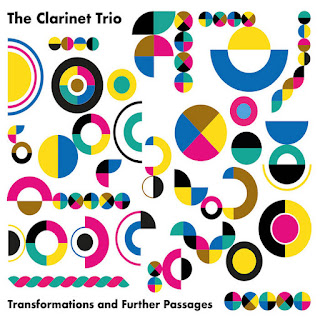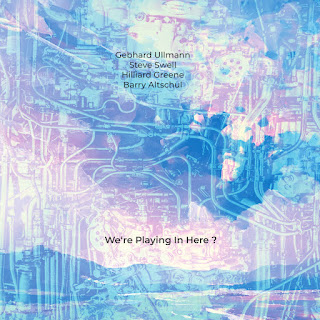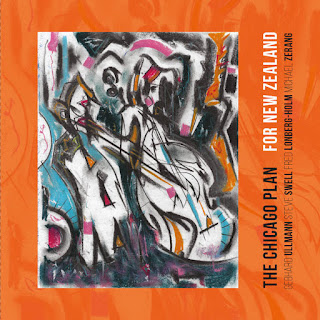By Paul Acquaro
Last year, German woodwind player and composer Gebhard Ullmann turned 65, but judging by his recent output, it seems safe to say that retirement is not on the agenda. In fact, between the latter half of 2022 and into early 2023, he has released an impressive batch of recordings that not only bristle
with creative energy but also show off quite different sides of his musical personality. Today’s review focuses on his latest acoustic leaning recordings,
followed tomorrow with a dive into his recent electro-acoustic releases. Let us begin
with the transfixing sounds of the venerable Clarinet Trio…
Clarinet Trio – Transformations and Further Passages (Leo
Records, 2022)
most boundary pushing. However, Ullmann’s
work is multifaceted and even the most ‘traditional’ of it is far from,
well, being that traditional at all. Strands of avant-garde, conventional jazz
melodies and improvisation are intricately intertwined in all of this
music. Some just lean more heavily to one than the other, in a sense.
a bit prejudiced and think, ‘hmm that Bb clarinet has its charms but can also
pierce the most hardened eardrums…,’ however, let go of these notions, on Transformations and Further Passages, Ullmann, along with Michael Thieke and Jürgen Kupke show just how
versatile and lovely not only the standard Bb clarinet (Kupke, Thieke)
can be, but also how sumptuousness of the bass clarinet (Ullmann), and that the alto (Thieke) is not so bad either.
1999, and on this one, their sixth, they explore choice modern jazz
compositions from the 1950’s and 60’s from a brilliant line-up of German
musicians including Albert Mangelsdorff, Karl Berger, Rolf and Joachim
Kühn, E.L. Petrowsky, Jutta Hipp, Joki Freund, and Manfred Schoof.
‘Collective #13’. Sweeping melodic lines and connective legato tones helps
set the tonal stage, highlighting the unique timbres of each instrument, from the gentle to the piercing, the lulling to the vibrant.
Then, they launch into ‘Cleopatra,’ a swinging number by saxophonist Joki
Freund. The mood is light, and the interplay is intricate. The
melody bounces between the instruments and the combination of the instruments
seems to produce more sound than one may expect from three unadorned
acoustic woodwinds. The atmosphere can also turn on a dime, as it does in
the middle of the tune, where extended techniques and harmonic overtones
take over.
trombonist’s 1963 album Tension. The track is indeed a study of tensions
and tones, sounding more like a modern classical composition than the
jazz-inflected originals. Towards the track’s end, the originals rhythmic
groove is meticulously emulated on the woodwinds. Jumping deeper into the
recording, each player has a solo track, Thieke takes the first, followed
by Ullmann and lastly, Kupke. These short interludes are fascinating, short
interludes that add some additional variety to an already varied
assortment. Not only are the arrangements satisfyingly eclectic —
compare the devilish arrangement of clarinetist Rolf Kuhn’s ‘Don’t Run’
to the satisfyingly blue-note rich ‘Der Blues ist der Koenig’ from
clarinetist Ernst Petrwosky, for example — but the individual musicianship
is absolutely peerless.
Gebhard Ullmann / Steve Swell / Hilliard Greene / Barry Altschul -We’re
Playing In Here ? (NoBusiness, 2022)
relationship between Ullmann and NYC based trombonist Steve Swell. The rest of the quartet on We’re Playing in Here ? is rounded out by New Yorkers too, namely bassist Hilliard
Greene and drummer Barry Altschul. This dynamic quartet has at least one other recording, Desert
Song (CIMP, 2004).
in 2007. While in a sense an archival recording, it sounds as if could have been
made last week. The album begins with an drum solo from Altschul, an
unorthodox and bold start. Soon Greene is laying down a solid
groove oriented bass line and the ‘front-line’ joins with the tandem melody
of Swell’s ‘Planet Hopping on a Thursday Afternoon.’ The upbeat track then opens up
with a looping, driving rhythm while Ullmann and Swell deliver
at first simultaneous melodies, and then split off individually. The solid, pulsating support gives Ullmann, and then Swell, a real
chance to just let loose. ‘La Mairposa,’ another composition from Swell,
follows an undulating path consisting of rapid scales that run headlong
into long, expressive passages. Ullmann gives his bass clarinet a workout,
effortlessly switching between extended tones and sudden squawks.
another composition from the trombonist – answers its own question. Whether
or not it is an expression of negative or positive wonder – the inspiration for the title is not revealed – the group explores the here
with purposeful vigor. The album closes with Ullmann’s quirky contribution ‘Kleine
Figuren #1.’ Swell and Ullmann once again offer a tangle of melodies while
Altschul and Greene lay down a solid, non-repetitive foundation – a fine
free-jazz closer to an excellent recording.
The Chicago Plan – For New Zealand (NotTwo, 2022) *****
the group Basement Research. Here the pair are joined by cellist and electronics master Fred Lonberg-Holm and drummer Michael Zerang.
finds Ullmann in a fiery mood, and for good reason: For New Zealand is dedicated to the 2019 Mosque shootings
in Christchurch. The attack, perpetuated by a white supremacist, killed 50
and injured dozens more. The album’s opener, Swell’s ‘Composite 13 – For New Zealand’ bottles the rage
and frustration from the horrific event into a stunning and dense 10 minutes of sound. Trombone,
cello, sax, and drums congeal into a musical fist, drawing blood as its
grip tightens until the very last forlorn tones. The follow up, ‘Welcome to the Red
Island,’ begins with Ullmann playing solo bass clarinet. His sonorous expressions signal a different approach from the last track and
when the others join, Lonberg-Holm provides sympathetic harmony, which
then welcomes a touching passage from Swell. ‘Sketch 6’ begins
with a exploratory attitude with each player offering a parallel melody,
sometimes connecting, sometimes contrasting. After a short, composed
passage, Zerang takes over with a percussion interlude and continues to be
a dominant force as the track finally opens up for an eviscerating set of
solos.
begins with the two horns playing a simple, syncopated melody, while the
cello offers a legato counter melody over the rumbles of the drum. The
track then turns noisy and Lonberg-Holm shreds the sonic curtains (mostly acoustically too, there seems to be very little overt electronics at all).
‘BA-8’ builds in swelling freely improvised waves, the passages organized
around short composed sections – or at least ones where the musician
seamlessly connect – which ultimately leaves an impressionistic soundscape
in its wake. The closer is ‘Variations on a Master Plan (part 1)’ a return to a theme that has appeared on other
work from Ullmann, like his 2003 album of with the same title from his
group Conference Call, as well as on several other albums. What one can say about ‘Part 1’ is
that is thrives off the same energy that possesses the other tracks here,
and wraps the masterful For New Zealand in a taught, defiant bow.




